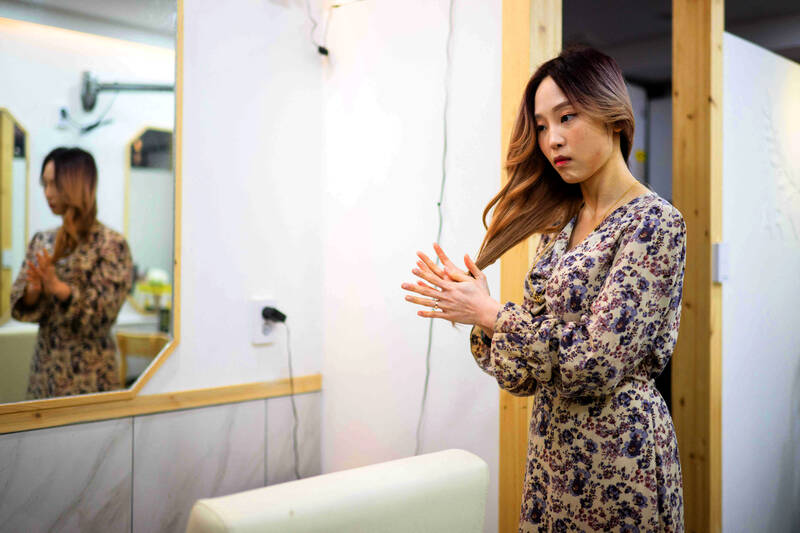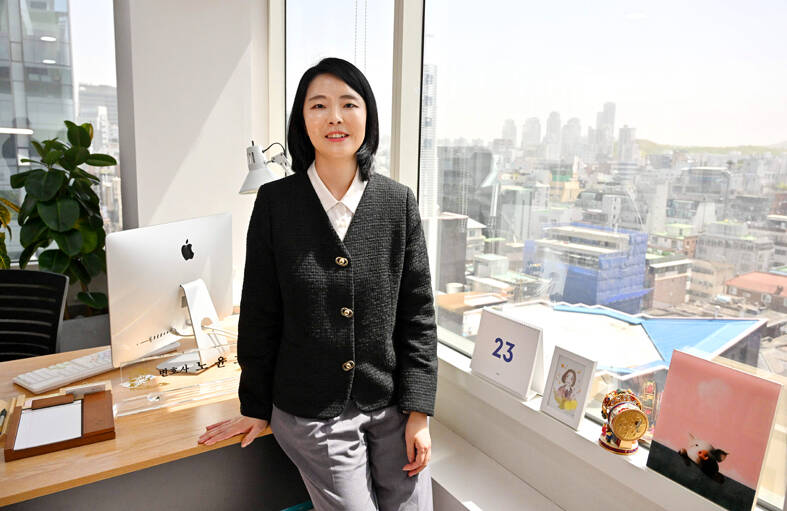Clutching an iron hair curler radiating scorching heat, a schoolgirl torments a classmate in a desolate school gymnasium.
The curler sizzles raw flesh, as the camera pans to show scars on the victim’s body.
This scene from The Glory, an audacious South Korean drama that achieved global success, shows viewers the depth of the country’s school bullying epidemic.

Photo: AFP
While some critics have panned The Glory for its deeply disturbing scenes, some of which are based on true events — including the use of a hair curler — the drama’s unapologetic depiction of pervasive school violence has resonated within South Korean society, reigniting calls for action to address the issue.
The latest government figures show cases of school violence and bullying have surged in the last decade in South Korea. In February, President Yoon Suk-yeol vowed to end school violence and the government has moved to ensure bullying records must be more prominently reflected when applying to university.
Yet teacher organizations argue that the efforts are insufficient and that more emphasis should be placed on preventing children from becoming bullies in the first place.

Photo: AFP
MORE MALICIOUS METHODS
Keumjoo Kwak, a psychology professor at Seoul National University, says that cases of school violence and bullying in South Korea reflect the dynamics of the collectivist society, where peer pressure plays a significant role in shaping behavior.
“We form a group and torment others. The victims may be ostracized by an entire class or even by the whole school,” Kwak said.
“The bullying entails persistent and repeated harm over time, which is frequently psychological or emotional.”
She says school bullying and school violence have always existed in South Korea, but the methods used have become more sophisticated and malicious, imitating scenes from films and using social media to spread the harm.
Bullying can have a severe impact on an individual.
Lee Sang-woo, an elementary school teacher and director at the Korean Teachers and Education Workers Union (KTU), says that school violence and bullying can significantly lower a student’s self-esteem and result in social isolation and increased levels of depression and anxiety.
“Victims often believe they cannot resolve the problem of school bullying, which negatively affects their physical and mental health. It can lead to academic decline and long-term avoidance of attending school, or even dropping out,” Lee said.
In extreme cases, some turn to taking their own lives. A recent study of university students who had experienced school violence found that more than half had considered suicide.
Kwak says the competitive and high-pressure environment many students in South Korea face can intensify the problem of bullying.
She says students are subjected to intense academic pressure and long hours of studying, primarily centered on university entrance exams. This creates a highly competitive, hierarchical, and monotonous environment devoid of physical activities to expend energy — and that can lead to some individuals bullying others “as a source of amusement”.
SURGE OF BULLYING CLAIM
Taking action against violence and bullying can be difficult, but for those who do, the struggle can be long, with one in three victims unable to get any help. The number of legal disputes involving school violence has doubled in the last two years; accused bullies filed the majority of them.
A recent controversy involving lawyer Chung Sun-sin and his son’s bullying case attracted widespread attention in South Korea. The son was accused of verbally abusing a high school peer and was ordered to transfer schools.
After it was reported that Chung had used his position as a senior prosecutor and legal expert to try to reverse disciplinary action against his son, his appointment as National Office of Investigation director was withdrawn.
The Chung Sun-sin scandal is not an isolated incident, and is part of a broader trend of #MeToo-style bullying revelations that have emerged over the last few years.
The accusers, often anonymous, expose the bullying of their alleged abusers, especially when those individuals are celebrities or hold influential positions. A recent case involved the contract termination of K-pop rookie Kim Ga-ram with girl group Le Sserafim after school bullying allegations appeared online.
The director of The Glory, Ahn Gil-ho, also became embroiled in such shaming after anonymous allegations of school violence surfaced online. He later admitted to it and apologized.
‘VICTIMS NEED SUPPORT’
As part of moves to stamp out school violence, lawmakers are considering amendments to relevant laws to ensure prompt resolution of school bullying cases.
The government has also announced the inclusion of bullying records in regular university admissions and enhanced support for victims.
Teacher groups have mostly welcomed the efforts but say more needs to be done to restore relationships between students.
In a statement, the Korean Federation of Teachers Union emphasized the importance of educational solutions over punitive measures, including the creation of specialized institutions for perpetrators and education for their parents.
The Korean Federation of Teachers Associations called for compensation for teachers dealing with cases of school violence and a more nuanced approach according to each school’s situation.
Kwak at Seoul National University says victims and perpetrators must be supported to address the problem.
“Victims need counselling and support to overcome their trauma. Perpetrators need to be held accountable for their actions but also given the opportunity to change. If we leave them as they are, they will continue to harm others as adults.”
Lee from the KTU says that building a trusting relationship that encourages students to tell their teachers about bullying and periodically patrolling the school premises will help.
Kwak also points to preventive education from a young age and the need to teach empathy, cooperation, and respect for others.
“Without implementing such measures, South Korea will continue to face dreadful cases of school violence every year.”

June 2 to June 8 Taiwan’s woodcutters believe that if they see even one speck of red in their cooked rice, no matter how small, an accident is going to happen. Peng Chin-tian (彭錦田) swears that this has proven to be true at every stop during his decades-long career in the logging industry. Along with mining, timber harvesting was once considered the most dangerous profession in Taiwan. Not only were mishaps common during all stages of processing, it was difficult to transport the injured to get medical treatment. Many died during the arduous journey. Peng recounts some of his accidents in

What does the Taiwan People’s Party (TPP) in the Huang Kuo-chang (黃國昌) era stand for? What sets it apart from their allies, the Chinese Nationalist Party (KMT)? With some shifts in tone and emphasis, the KMT’s stances have not changed significantly since the late 2000s and the era of former president Ma Ying-jeou (馬英九). The Democratic Progressive Party’s (DPP) current platform formed in the mid-2010s under the guidance of Tsai Ing-wen (蔡英文), and current President William Lai (賴清德) campaigned on continuity. Though their ideological stances may be a bit stale, they have the advantage of being broadly understood by the voters.

Artifacts found at archeological sites in France and Spain along the Bay of Biscay shoreline show that humans have been crafting tools from whale bones since more than 20,000 years ago, illustrating anew the resourcefulness of prehistoric people. The tools, primarily hunting implements such as projectile points, were fashioned from the bones of at least five species of large whales, the researchers said. Bones from sperm whales were the most abundant, followed by fin whales, gray whales, right or bowhead whales — two species indistinguishable with the analytical method used in the study — and blue whales. With seafaring capabilities by humans

In a high-rise office building in Taipei’s government district, the primary agency for maintaining links to Thailand’s 108 Yunnan villages — which are home to a population of around 200,000 descendants of the Chinese Nationalist Party (KMT) armies stranded in Thailand following the Chinese Civil War — is the Overseas Community Affairs Council (OCAC). Established in China in 1926, the OCAC was born of a mandate to support Chinese education, culture and economic development in far flung Chinese diaspora communities, which, especially in southeast Asia, had underwritten the military insurgencies against the Qing Dynasty that led to the founding of